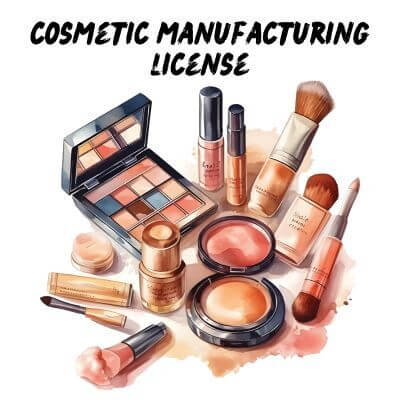

Starting a cosmetics company may be an exciting and intimidating endeavour. A license for the production of cosmetics stands out among the many factors to be taken into account as an essential step in starting a legal and profitable business. We go into great detail in this extensive guide about the complexities of getting a license to manufacture cosmetics, explaining its significance, the application procedure, the legal requirements, and helpful hints for negotiating this regulatory maze.
Understanding the importance of a cosmetic manufacturing license in the cosmetics sector is essential before getting into the specifics of obtaining one. A license to manufacture cosmetics is essentially a regulatory body's seal of approval, certifying that your products meet safety, quality, and labelling requirements.
To ensure adherence to regulatory procedures, obtaining a license to manufacture cosmetics entails several stages. Although the application procedure differs based on the jurisdiction, several basic procedures are universal.
Research & Preparation: Start by delving deeply into the legal framework that governs the production of cosmetics in your intended market. Become familiar with the particular rules, paperwork, and guidelines that are required by State Drugs Dept. or other regulatory bodies.
Documentation: Get ready all the paperwork needed for the application procedure. This could contain a thorough business plan, information on the formulation of the product, production protocols, safety data sheets, and documentation attesting to Good Production Practices (GMP) compliance.
Application Submission: Send the State Drugs Authority your application for a license to manufacture cosmetics. In order to accelerate the review process, make sure that all necessary documentation is accurate and comprehensive.
Inspections & Audits: To ensure adherence to safety and quality standards, The State Drugs regulatory bodies may carry out inspections and audits of your production facilities. During these inspections, cooperate completely, and take immediate action to fix any flaws found.
Review & Approval: You will be notified that your license to manufacture cosmetics has been approved after completing the application review procedure and compliance verification. Best wishes! You are now prepared to start your adventure into the creation of cosmetics.
For more details, please visit https://metacorp.in/general-registration/cosmetics-license
The purpose of the regulatory requirements for getting a license to manufacture cosmetics is to protect customer safety and guarantee the quality of the product. These specifications usually cover a range of topics related to the manufacturing of cosmetics, such as labelling, packaging, manufacturing procedures, and ingredient safety.
Ingredient Safety: Only ingredients that are safe for consumer use may be used in cosmetic goods. Make sure that none of the substances you employ in your formulations poses known health hazards and that they all adhere to regulatory requirements.
Label Compliance: Giving consumers accurate information about cosmetic items requires proper labeling. All contents must be listed, product expiration dates must be shown, usage directions must be included, and warning labels for potentially dangerous ingredients must be included.
Packaging Standards: Packaging is essential to preserving the integrity of the product and guaranteeing customer satisfaction. Respect the packaging guidelines provided by regulatory bodies to avoid contamination, leaks, and other problems with quality.
Good Manufacturing Practices (GMP): Adhering to GMPs is essential to guaranteeing the consistency, safety, and quality of cosmetic products. To comply with GMP requirements, put in place reliable manufacturing procedures and quality control systems.
It can be difficult to navigate the license application procedure for cosmetic manufacturing, but you can increase your chances of success by carefully planning and following all legal criteria. The following are some crucial pointers to help you along the way:
Remain Up to Date: Stay informed about any revisions or modifications to cosmetic laws in your intended market. It is imperative to remain informed about any changes to regulatory standards to ensure compliance.
Seek Professional Assistance: Regulatory consultants or attorneys with experience in cosmetic compliance may be able to help if you're unfamiliar with the regulatory environment or find the process daunting.
Invest in Quality Control: To guarantee consistency, safety, and product effectiveness, put strong quality control procedures in place at every stage of the production process. Frequent analysis and testing can assist in locating possible problems and addressing them before they get worse.
Keep Extensive Records: Keep meticulous records of every step of your cosmetic manufacturing process, including the procurement of ingredients, formulation specifics, production methods, and quality assurance protocols. Comprehensive documentation helps with regulatory compliance and is an important tool for internal management and product development.
Accept Continuous Improvement: Customer tastes and legal criteria are always changing in the dynamic cosmetics sector. Adopt a culture of continuous improvement and be willing to modify your procedures and output in response to evolving requirements and specifications.
If you wish to apply online for Cosmetics Manufacturing License, please click HERE
For CDSCO cosmetics license for import, click HERE
For CosmeticsManufactuirng License in Delhi, click here
One of the most important steps in starting a legal and profitable cosmetic business is getting a license to manufacture cosmetics. You can create the conditions for a successful business in the exciting world of cosmetics by realising the significance of regulatory compliance, carefully completing the application process, and upholding quality and safety standards. Recall that adhering to regulations is a commitment to both consumer safety and high-quality products, not merely a need.





We are the pioneers in offering environmental consulting services to our patrons, giving us the first mover advantage & keeping us ahead of our competitors.
Very experienced in filing, monitoring & issuance of CDSCO Certificates, Drugs Licensing, Environmental Impact Assessment, AERB certificates, Pollution Control Board CTE & CTO, Waste Management Authorization from State Pollution Control Boards, Fertilizers & Insecticides Licensing
